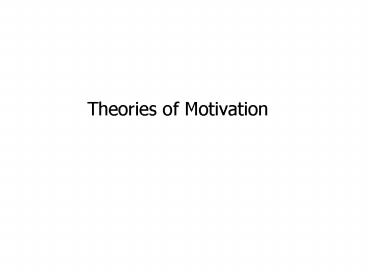Theories of Motivation - PowerPoint PPT Presentation
1 / 22
Title:
Theories of Motivation
Description:
Intensity: How hard a person tries. Direction: Where effort ... Extrinsic Motivators ... Extrinsic factors (context of work) Company policy and administration ... – PowerPoint PPT presentation
Number of Views:47
Avg rating:3.0/5.0
Title: Theories of Motivation
1
- Theories of Motivation
2
What Is Motivation?
- Motivation
- The intensity, direction, and persistence of
effort a person shows in reaching a goal - Intensity How hard a person tries
- Direction Where effort is channelled
- Persistence How long effort is maintained
3
Theory X and Theory Y
- Theory X
- Assumes that employees dislike work, will attempt
to avoid it, and must be coerced, controlled, or
threatened with punishment if they are to
perform. - Theory Y
- Assumes that employees like work, are creative,
seek responsibility, and can exercise
self-direction and self-control.
4
Motivators
- Intrinsic Motivators
- A persons internal desire to do something, due
to such things as interest, challenge, and
personal satisfaction. - Extrinsic Motivators
- Motivation that comes from outside the person and
includes such things as pay, bonuses, and other
tangible rewards.
5
Needs Theories of Motivation
- Basic idea
- Individuals have needs that, when unsatisfied,
will result in motivation - Maslows Hierarchy of Needs Theory.
- Motivation-Hygiene Theory
- ERG Theory
- McClellands Theory of Needs
6
Herzbergs Motivation-Hygiene Theory
- Hygiene factors the sources of dissatisfaction
- Extrinsic factors (context of work)
- Company policy and administration
- Unhappy relationship with employees supervisor
- Poor interpersonal relations with ones peers
- Poor working conditions
7
Herzbergs Motivation-Hygiene Theory
- Motivators the sources of satisfaction
- Intrinsic factors (content of work)
- Achievement
- Recognition
- Challenging, varied, or interesting work
- Responsibility
- Advancement
8
Criticisms of Motivation-Hygiene Theory
- The procedure that Herzberg used is limited by
its methodology. - The reliability of Herzbergs methodology is
questioned. - Herzberg did not really produce a theory of
motivation. - No overall measure of satisfaction was used.
- The theory is inconsistent with previous research.
9
Alderfers ERG Theory
- Existence
- Concerned with providing basic material existence
requirements. - Relatedness
- Desire for maintaining important interpersonal
relationships. - Growth
- Intrinsic desire for personal development.
10
McClellands Theory of Needs
- Need for achievement
- The drive to excel, to achieve in relation to a
set of standards, to strive to succeed - Need for power
- The need to make others behave in a way that they
would not have behaved otherwise - Need for affiliation
- The desire for friendly and close interpersonal
relationships
11
Summary Impact of Theory
- Maslow Enjoys wide recognition among practising
managers. - Herzberg Shows that more than one need may
operate at the same time. - Alderfer Seen as a more valid version of the
need hierarchy. - McClelland Tells us that high need achievers do
not necessarily make good managers, since high
achievers are more interested in how they do
personally.
12
Summary Support and Criticism of Theory
- Maslow Criticized for how data were collected
and interpreted. - Herzberg Not really a theory of motivation
Assumes a link between satisfaction and
productivity that was not measured or
demonstrated. - Alderfer Ignores situational variables.
- McClelland Good empirical support, particularly
on needs achievement.
13
Process Theories of Motivation
- Look at the actual process of motivation
- Expectancy theory
- Goal-setting theory
14
Expectancy Theory
- The theory that individuals act depending on
whether - their effort will lead to good performance,
whether good - performance will be followed by a given outcome,
and - whether that outcome is attractive to them.
15
Goal-Setting Theory
- The theory that specific and difficult goals lead
to higher performance. - Goals tell an employee what needs to be done and
how much effort will need to be expended. - Specific hard goals produce a higher level of
output than does the generalized goal of do your
best.
16
Management by Objectives
- A program that encompasses
- Specific goals
- Participative decision-making
- Explicit time period
- Performance feedback
17
Goals Should Be SMART
- For goals to be effective, they should be SMART
- Specific
- Measurable
- Attainable
- Results Oriented
- Time bound
18
Equity Theory
- Main point
- Individuals compare their job inputs and
- outcomes with those of others and then respond so
as - to eliminate any inequities.
19
Motivating Employees Through Reinforcement
- Skinner suggested that people learn how to behave
to get something they want or to avoid something
they dont want. - This idea is known as operant conditioning.
- Behaviour is influenced by the reinforcement or
lack of reinforcement brought about by the
consequences of the behaviour.
20
Designing Highly Motivating Jobs
Critical psychological states
Core job dimensions
Personal and work outcomes
High internal work motivation High quality
work performance High satisfaction with the
work Low absenteeism and turnover
Experienced meaningfulness of the
work Experienced responsibility for outcomes of
the work Knowledge of the actual results of the
work
Skill variety Task identity Task
significance Autonomy Feedback
21
Computing a Motivating Potential Score
22
Job Redesign
Job Rotation Job Enlargement































